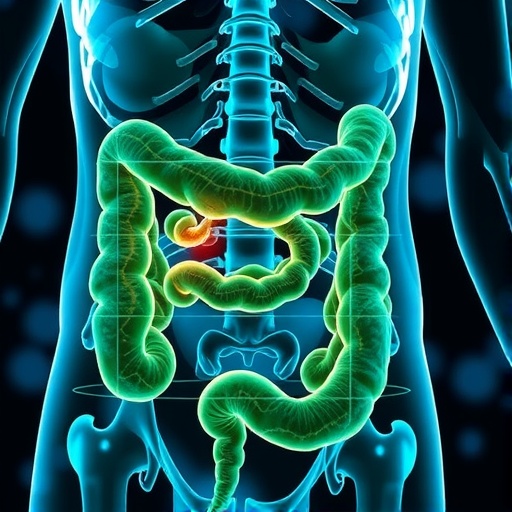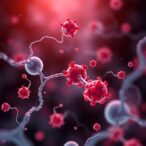
Colorectal cancer (CRC) remains a formidable challenge in contemporary oncology, ranking as the second leading cause of cancer-related deaths in the United States and standing as the most prevalent malignancy globally. Characterized by uncontrolled cell growth in the colon or rectum—the two major anatomical segments of the large intestine—CRC presents a complex clinical landscape. Notably, epidemiological trends reveal an alarming increase in mortality among individuals under 55 since the mid-2000s, underscoring the urgent need for innovative and effective therapeutic strategies to improve survival outcomes and combat disease progression.
Recent advances reported in a cutting-edge study published in The Journal of Immunology have illuminated the promising potential of cytokine-induced killer (CIK) cell therapy as a transformative approach in the management of CRC. CIK cells are a unique subset of immune effector cells derived from peripheral blood mononuclear cells, which are ex vivo expanded and activated through specific cytokine cocktails, resulting in potent antitumor activity. By harnessing and augmenting the patient’s own immune system, CIK therapy aims to selectively target and eradicate neoplastic cells, thereby offering a novel immunotherapeutic avenue that could circumvent the limitations of conventional modalities like chemotherapy and surgery.
The retrospective observational study meticulously examined cohorts of CRC patients treated either with standard chemotherapy and/or surgical intervention or in combination with CIK cell therapy. Patients were enrolled over a six-year period from 2008 to 2014 and followed longitudinally through early 2020, allowing for comprehensive analysis of both progression-free survival (PFS)—the interval prior to disease worsening—and overall survival (OS), marking death from any cause. Remarkably, the data demonstrated that patients receiving adjunctive CIK cell treatment exhibited statistically significant improvements in both PFS and OS, irrespective of cancer stage, signaling a potential paradigm shift in therapeutic outcomes for CRC patients.
.adsslot_bZcy1HW8N9{ width:728px !important; height:90px !important; }
@media (max-width:1199px) { .adsslot_bZcy1HW8N9{ width:468px !important; height:60px !important; } }
@media (max-width:767px) { .adsslot_bZcy1HW8N9{ width:320px !important; height:50px !important; } }
ADVERTISEMENT
One of the pivotal challenges in immunotherapy lies in identifying biomarkers predictive of treatment responsiveness. The investigators, therefore, delved into the molecular landscape to unearth candidate markers that could stratify patients based on likelihood of benefit from CIK therapy. Their analysis converged on carcinoembryonic antigen (CEA), a glycoprotein notoriously expressed in colorectal neoplasms and historically utilized as a prognostic biomarker for disease recurrence. Elevated serum CEA levels were found to correlate with differential responses to CIK therapy, suggesting that pre-treatment quantification of this antigen could serve as a pragmatic and non-invasive biomarker to guide clinical decision-making and personalize treatment regimens.
Dr. Yi Zhang, the principal investigator and Director of the Biotherapy Center at the First Affiliated Hospital of Zhengzhou University, highlighted the implications of these findings, noting that advanced-stage CRC patients conventionally face grim prognoses and substantial risk of relapse following surgery. The integration of CIK cell therapy, especially when combined with existing treatment modalities, holds promise to markedly enhance survival metrics and quality of life for these individuals. This therapeutic synergy could redefine the treatment algorithm, offering hope where traditional therapies have stagnated.
Despite these advances, the study acknowledges heterogeneity in responses, recognizing that a subset of patients remains refractory to CIK therapy. This underscores the necessity of continued mechanistic investigations into tumor microenvironment dynamics, immune evasion pathways, and host immune competence, which may influence the efficacy of cell-based immunotherapies. The identification of robust predictive biomarkers like CEA represents a crucial step toward precision medicine, optimizing patient selection and maximizing therapeutic benefit while minimizing unnecessary exposure and adverse events.
The mechanistic basis of CIK cell function involves a complex interplay of innate and adaptive immune responses. These cells exhibit non-major histocompatibility complex (MHC)-restricted cytotoxicity, mediated through activating receptors such as NKG2D, and secrete pro-inflammatory cytokines that reshape the tumor milieu. This multifaceted immune assault disrupts tumor proliferation and metastasis, potentially overcoming traditional resistance mechanisms. Moreover, the ex vivo expansion of CIK cells facilitates generation of large cell numbers with enhanced cytolytic activity, making the therapy both scalable and feasible within clinical settings.
Looking ahead, the research team plans to extend this foundational work by exploring combinatorial protocols integrating CIK therapy with chemotherapy, radiotherapy, and emerging immunotherapeutics such as immune checkpoint inhibitors. Prospective clinical trials are being designed to validate these findings in a controlled setting, aiming to establish CIK treatment as a standard-of-care option for CRC. Such trials will not only evaluate efficacy and safety profiles but also probe mechanistic biomarkers and immune correlates to refine personalized therapy further.
The accessibility of a simple blood-based assay to measure serum CEA prior to treatment would revolutionize patient management, enabling oncologists to swiftly identify candidates most likely to derive benefit from CIK therapy. This approach aligns with contemporary trends emphasizing minimally invasive diagnostics and tailored treatment, thereby enhancing patient outcomes and healthcare resource utilization.
Beyond colorectal cancer, the successes observed in this study invigorate broader interest in cell-based immunotherapies targeting other solid tumors. The versatility and adaptability of CIK cells render them attractive candidates for multi-cancer therapeutic frameworks, potentially reshaping the immuno-oncology landscape. As the scientific community strives to decipher tumor-immune interplay, therapies like CIK cells chart an exciting course toward durable remissions and long-term survival.
The implications of this study extend beyond clinical applications to public health policies, urging incorporation of immunotherapeutic options into national cancer control programs. By fostering collaboration among immunologists, oncologists, and translational researchers, the collective endeavor can accelerate innovation pipelines and deliver tangible benefits to patients worldwide. Education and dissemination of these findings through platforms such as The Journal of Immunology and professional societies reinforce the critical role of interdisciplinary efforts in combating malignancies like CRC.
In conclusion, the demonstrated efficacy of CIK cell therapy in enhancing survival for colorectal cancer patients signifies a remarkable stride forward in cancer immunotherapy. The integration of biomarker-driven patient selection through serum CEA measurement constitutes a leap toward personalized oncology, aiming to optimize therapeutic outcomes and reduce the burden of CRC. Collaborative endeavors and future clinical trials inspired by these findings promise to solidify the role of CIK therapy in routine clinical practice, ultimately transforming the prognosis of patients afflicted with this pervasive malignancy.
Subject of Research: People
Article Title: Serum carcinoembryonic antigen levels as a predictive biomarker for cytokine-induced killer cell immunotherapy in patients with colorectal cancer
News Publication Date: 9-Apr-2025
Web References:
https://doi.org/10.1093/jimmun/vkaf037
https://news.aai.org/2025/06/23/cell-therapy-improves-overall-survival-of-patients-with-colorectal-cancer/
References:
Zhang, Y., et al. “Serum carcinoembryonic antigen levels as a predictive biomarker for cytokine-induced killer cell immunotherapy in patients with colorectal cancer.” The Journal of Immunology, 2025. DOI: 10.1093/jimmun/vkaf037.
Keywords: Colorectal cancer, Cancer, Cell therapies, Cancer immunotherapy
Tags: cell therapy in colorectal cancerchallenges in colorectal cancer managementcolorectal cancer survival ratescytokine-induced killer cellseffective therapies for cancer progressionenhancing patient outcomes in CRCimmune system and cancer therapyimmunotherapy for cancer treatmentinnovative cancer treatment strategiesmortality trends in young colorectal cancer patientsrecent advances in oncologytumor-targeting immune therapies



